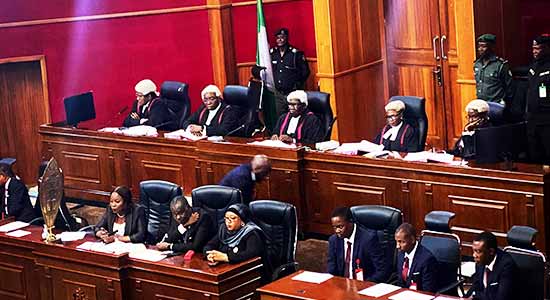The Presidential Election Petition Court (PEPC) has dismissed the application by the Peter Obi and the Labour Party (LP) for the live streaming of the court’s proceedings.
The court’s Presiding Justice (PJ), Justice Haruna Tsammani in a ruling a moment ago, held that such practice was not allowed by any law and could not be introduced by the court without the necessary legal provisions being put in place.
Justice Tsammani, who read the lead-ruling of the court’s unanimous decision, held that the issue of whether or not proceedings should be live streamed is a policy matter to that could only be put in place by the Judiciary or the President of the Court of Appeal.
The court said its decision in similar application by Atiku and the PDP should apply to the application by Obi and the LP.
Additionally, the court observed that the request was not included in any of the petitions it was considering, noting that it was only supported by a sentimental argument that the gesture would help the electorates.
The panel held that the petitioners had not demonstrated how broadcasting the proceedings would help their cause.
Former Vice President and PDP candidate, Atiku Abubakar, was the first to request live coverage of the tribunal’s proceedings. Subsequently, Obi of the LP also made the same request.
Their lead lawyers, Livy Uzoukwu, a Senior Advocate of Nigeria (SAN), for Obi, and Chris Uche (SAN), for Atiku, argued that the petitions filed to contest the declaration of Tinubu as the winner of the presidential poll were of enormous national importance and public interest.
“Televising court proceedings is not alien to this Honourable Court and will enhance public confidence”, Obi’s lawyer Uzoukwu argued.
Atiku and the PDP, in the application filed on May 8 requesting live coverage of the tribunal’s proceedings, asked the tribunal for “an order directing the court’s registry and the parties on modalities for admission of media practitioners and their equipment into the courtroom”.
They described the election petition as a matter of public interest, with millions of Nigerian citizens and voters as stakeholders with a constitutional right to receive information.
“An integral part of the constitutional duty of the court to hold proceedings in public is a discretion to allow public access to proceedings either physically or by electronic means,” the application filed by Atiku and the PDP said.
However, in separate processes filed before the court, both the President-elect Tinubu and the APC urged the court to dismiss the applications for live broadcast.
Tinubu described the request as an “abuse of the processes of court”.
Tinubu, through his lawyer, Wole Olanipekun, SAN, asked the tribunal to dismiss the application, arguing that the relief sought by the applicants was not such that the court could grant.
Arguing against the application in a written address, Olanipekun warned that the court should not be made “an arena for public entertainment”.
Olanipekun noted that Atiku and the PDP failed to acknowledge the practice directions issued by the respective courts to facilitate such proceedings.
Following the declaration of Tinubu as the winner of the 2023 presidential election, Atiku and Obi filed separate petitions challenging the result declared by the Independent National Electoral Commission (INEC).
They alleged that irregularities in thousands of
polling units marred the poll.
In this article

